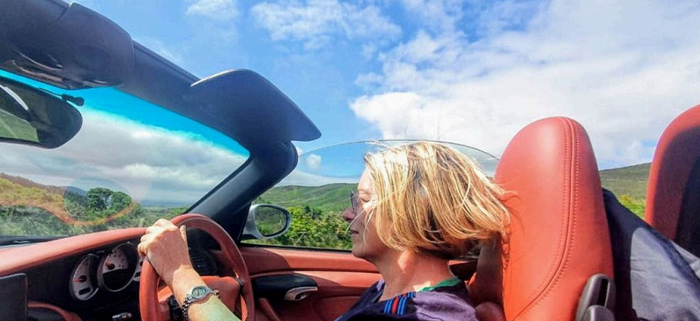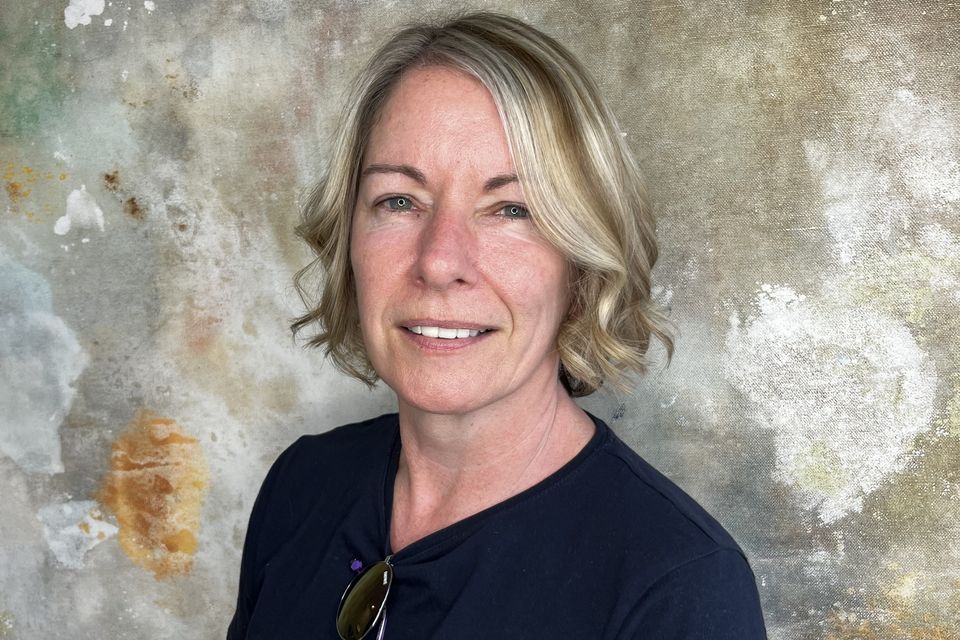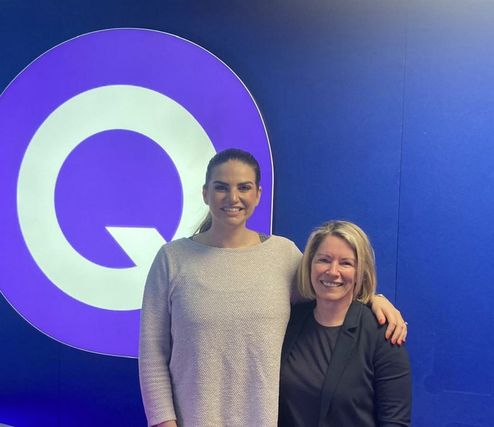Meet Tina Lannin, the woman using her lip-reading skills to tackle crime
Tina Lannin is an extraordinary entrepreneur who turned a necessity into a global enterprise with her company 121 Captions.
Born deaf into a family of hearing people she had to learn early how to lip-read to get by and is now one of the UK’s foremost lipreading experts.
Her company uses lip-reading to provide captions to include people who are deaf or hard of hearing at major events, in training, teaching and the workplace.
It has grown to now employ a team of 300 captioners worldwide, providing stenography services in 23 languages.
She works with a range of blue-chip clients including Microsoft, Google, Facebook, Twitter, Oxford University and Disney as well as police forces, the media and the National Crime Agency, to name but a few.
The largest event she has covered to date was the World Congress in 2017 when her team provided live human captions in 19 rooms simultaneously.
Tina’s success is all the more impressive given the challenges she faced growing up deaf in a hearing world that often underestimates the capabilities of those with disabilities.
A difficult youth
School life wasn’t easy for Tina and she also had to give up on her chosen career in law. She recalls how her early years gave her the resilience and strength which has helped to shape the successful businesswoman she is today: “I had to lip-read as I was the first deaf person in my family, and they didn’t know how to deal with it.
“I was treated like one of them and I just had to cope and ‘get on with it’, which I’ve done all my life.
“I became very observant of body language and good at reading the room (but still unable to pick up on the tone of conversations).
University life
“At college, I was bullied by another pupil because of my difference/deafness. It only takes one person to ruin an experience. Everyone else was grand. I was the only deaf pupil and had to educate my teachers on communication tactics and basic deaf awareness.
“I couldn’t hear the other students chat so I found social interactions challenging unless I was with one of my friends, as I can usually manage a one-to-one conversation. So, it was quite isolating but fuelled my determination to succeed against the odds.”
Tina studied business with Japanese at Ulster University and then relocated to London to read law; however, with no understanding of the deaf community within the profession, she found it impossible to secure a job.
She explains: “I was very frustrated at the time as my dream was to be a solicitor and I’d loved my legal placements and training.
“The law firms had no deaf awareness at all; awareness has improved a little now with the work of disability employment agencies in London and the Two Ticks scheme, and general awareness is a little better, but there is still a lot of work to do in the area of deaf awareness, particularly in the workplace.
“We have a long way to go so that all employers take a serious and considered look at the person’s ability, not just the disability.
“After graduating from university, I did an experiment. I sent six CVs to employers then sent another six CVs out and removed all mention of my hearing loss.
“I had no reply to the first batch, but every employer in the second batch phoned asking for an interview. Of course, I couldn’t answer the phone and my mother would answer and tell them ‘She’s deaf’ and they’d instantly drop me. That gave me more fuel for my fire.”
Starting 121 Captions
Tina began working as finance manager for a deaf charity in London called Hearing Concern, now Hearing Link. For meetings and teleconference calls, the charity brought in stenographers (speech-to-text reporters), whose work fascinated Tina and she quickly began to learn how to caption.
She started to pave the way towards becoming an entrepreneur when she trained as a lip-reading teacher and followed that with forensic lip-reading, working for various police forces, investigative agencies, the National Crime Agency, newspapers and TV. She added deaf awareness training to her ever-growing list of skills and then retrained as a career consultant for the University of London.
She recalls: “I knew a lot of deaf people in London through my social life and all the work I did — London was just amazing for the opportunities it gave me.
“Eventually I joined all the dots in my life and pulled them together, and 121 Captions was born.
“I started trading in 2008. I still sit back and think, I can’t believe I’ve built a business from a laptop and the internet.”
Going from strength to strength
From multinational corporations to prestigious news broadcasters, Tina’s clientele expanded rapidly as word slowly spread of her unparalleled expertise.
One of the most remarkable aspects of her business is its application in high-stakes environments.
As a forensic lip-reader, she has provided crucial insights into private conversations that would otherwise remain undisclosed such as conversations between the Royal family during state occasions and even elite athletes.
Amidst the pomp and grandeur of a royal event, Tina is sought after by news providers for her incredible ability to decipher the whispered exchanges between members of the monarchy.
Similarly, during the fervour of the World Cup, Tina’s keen eye has captured the unspoken words exchanged between footballers on the field.
She says: “Twitter asked us to lip-read the 2014 World Cup. I brought a team to their London office for the day, and we watched the World Cup on a large screen.
“When a referee, coach or player said something, if we could lip-read it then we would confirm what we saw with the Twitter team, and they would tweet the comments. It was great fun and Twitter was great to work with.
“I was also asked to lip-read video footage of Prince George leaving hospital in London on July 23, 2013, for ABC News.
“I now lip-read at every Royal family baptism, wedding, funeral, major ceremonial events and any event attended by Megan and Harry.
“Doing William and Kate’s wedding for Sky News was great fun. I was able to rewind parts where I could see something said and wanted to check it again.
“William turned to Charles and said: ‘This was supposed to be a small family affair.’ I caught Charles and Camilla arguing in their glass carriage on the way to the ceremony, sadly I can’t remember what about.”
From the sublime to the ridiculous, she has had many unusual requests for lip-reading services including being asked by a paranormal investigator to lip-read a ghost caught on video.
“I never ever actually got to see that video,” she admits.
“I also lip-read David Cameron at a garden party stating they had broken the party manifesto. I have also lip-read arguments in offices for staff disciplinary issues, also old First World War film clips; they were absolutely fascinating to watch.”
From the Oscars to murder trials
Catching the whisperings of celebrities has become a big part of her business, covering huge events like the Baftas and the Oscars.
She says: “Celebrity events have become quite the norm now. I did a lot of Wimbledon matches in the early days of 121 Captions but now everyone covers their mouths as they realise they may be watched, and this is happening in football now too.”
On a more serious note, she is also invaluable in hospital settings, lip-reading for patients with a tracheostomy who have no voice and she has even had translated responses from patients when told they are dying.
No stranger to the courtroom she has lip-read for defendants, usually with no voice.
She says: “I once had to lip-read a witness who was completely paralysed and could only move one corner of her mouth, which was an incredibly difficult assignment especially as I had not been informed of this and it was directly after a stand-up row in the court building lobby with six staff over access for my hearing dog — they wouldn’t allow my dog in.”
The value of her skills knows no bounds. One very difficult job involved a commission from ITN to watch clips sent to them by Al Qaeda of beheadings and prisoners pleading before losing their lives.
She admits: “The videos were harrowing. I was asked to work out what they were saying where the audio was poor, before releasing this on the news.
“I’ve worked on murder trials, I’ve watched footage of fights, murders, rapes, some of it is very difficult to watch.”
Outside of work which she now controls from her seaside home in Groomsport, she is a bit of an adrenalin junkie and a regular at Kirkistown racetrack.
“I’m a member of the Porsche Club and that sparked my interest.
“I did my advanced driver training and enjoyed that very much. The Institute of Advanced Motorists were kind enough to make reasonable adjustments for me.
“We had to do the observed drives and test differently, like motorbike riding, with frequent stops and chats, as I can’t lip-read and drive at the same time.”
An inspiration for many
Tina’s success story serves as a testament to the boundless potential of people with disabilities.
Through her resilience and innovation, she has not only overcome personal obstacles but has also reshaped industries traditionally dominated by sound.
Whilst society has made improvements in its approach to the deaf community, she believes a lot of work still needs to be done.
“My top tip is to just ask a deaf person, what can we do to help you, and listen to our needs,” she adds.
“Most of the time, very simple adjustments are needed such as look at the deaf person when speaking, speak clearly, speak one at a time, please get rid of the background noise, perhaps move to a quieter place. Background noise is a big conversation killer.
“I recently discovered that hearing people naturally talk over one another — and can still hear each other — but do this to a deaf person, and they have to stop talking to lip-read/hear, it just cuts communication dead for a deaf person.
“As my story illustrates, resilience, innovation, and a commitment to accessibility can transform challenges into opportunities for growth and change.
“I find that ableist attitudes can be far more disabling than lack of accessibility and technology, and I always strive for a shift towards inclusivity and empathy. Funnily enough, the biggest favour a hearing person can do for a deaf person is to simply — listen.”
This article was originally published in the Belfast Telegraph, May 2024






Leave a Reply
Want to join the discussion?Feel free to contribute!